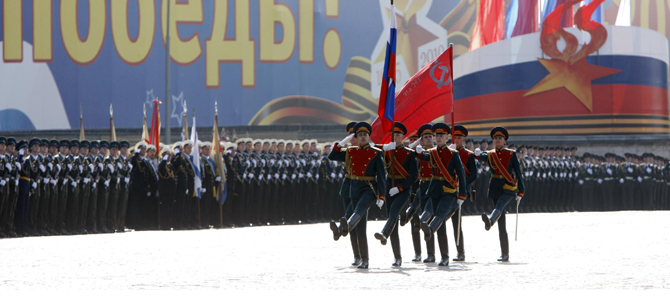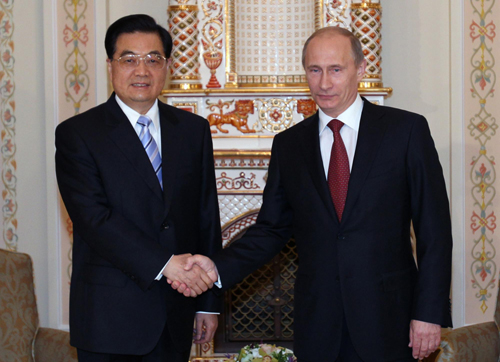Chinese, Russian leaders seek enhanced strategic ties
(Xinhua)
Updated: 2010-05-10 14:22

MOSCOW - Chinese President Hu Jintao and his Russian counterpart Dmitry Medvedev met here on Sunday to discuss ways to strengthen bilateral strategic relations of cooperation and partnership.
 a special handshake a special handshake
Chinese President Hu Jintao (L) and Russian Prime Minister Vladimir Putin shake hands as they meet in Novo-Ogaryovo residence outside Moscow, May 8, 2010. President Hu is in Moscow for celebrations marking the 65th anniversary of the victory of the Great Patriotic War over Nazi Germany. [Xinhua]
|
Hu was in Moscow for the celebrations marking the 65th anniversary of the victory of the Great Patriotic War over Nazi Germany.
| ||||
Medvedev said Russia and China shared similar views on the history of World War II, and the attendance of the two heads of states at the celebrations was of great significance.
The Chinese president said both sides should promote cooperation in trade and energy, as well as people-to-people and cultural exchanges, adding the two countries should implement in earnest the summer camp program that will bring 1,000 Russian middle and primary school students to China.
Hu brought forward a four-point proposal for boosting China-Russia strategic coordination.
First, both countries should strengthen their coordination and cooperation in the institutionalization of the Group of 20, seek greater say for the two countries in international affairs and uphold their just rights and interests and those of the developing countries.
Second, both countries should keep close communication, and help maintain regional peace and stability.
Third, both sides should enhance cooperation in fighting terrorism, as well as the "three forces," namely extremism, separatism and terrorism.
And fourth, both countries should strengthen coordination and cooperation in such major international issues as climate change and energy security.
Medvedev shared Hu's views on further boosting bilateral relations, saying that Russia was ready to strengthen cooperation with China in economy and trade, science and technology, energy, culture, and regional affairs.
The Russian president said both sides should make joint efforts to make the "Year of the Chinese Language" in Russia a success, regarding it as a major task for bilateral cultural cooperation this year.
Medvedev congratulated China over the grand opening of the Shanghai World Expo, and voiced his expectation to attend Russia's National Pavilion Day at the Expo.
The meeting was the second between the two leaders in less than a month. Hu and Medvedev met in Brasilia on April 15 on the sidelines of a summit of the BRIC nations -- Brazil, Russia, India and China.
On Sunday, Hu and other leaders took part in a series of celebrating activities, including a military parade at the Red Square, a wreath-laying ceremony at the Tomb of the Unknown Soldiers, and a banquet hosted by President Medvedev.
The parade, which was accompanied by over 50 Russian and foreign military orchestras, was divided into the military personnel's march, the parade of military armaments on the ground and in the sky.
More than 10,000 personnel, 159 military armaments, 127 aircraft and helicopters participated in the Red Square parade.
On Saturday, Hu called for further strengthening of China-Russia ties while meeting with some Russian soldiers who helped China battle Japanese aggressor troops in the World Anti-Fascist War.
During his meeting with the Russian veterans, Hu said the Chinese people would never forget the Soviet Red Army's contributions to the success of China's Anti-Japanese War.
Many Russian soldiers and citizens sacrificed their lives for the liberation of the Chinese people, he said.
Fighting together against the fascists, the Chinese and Russian people forged a profound friendship, he added.
"The friendship cemented with blood and people's lives lays a solid foundation for the China-Russia strategic relations of cooperation and partnership," Hu said.
Hu also called for a correct view of history, saying the Soviet Union and China's contributions to victory in the World Anti-Fascist War are "ironclad."
The Chinese president returned to Beijing Monday morning after attending the celebrations in Moscow.
Hu's Moscow tour to boost strategic partnership
(Xinhua)
Updated: 2010-05-05
BEIJING - Chinese President Hu Jintao's upcoming visit to Moscow will boost the China-Russia strategic partnership for coordination, China's Assistant Foreign Minister Cheng Guoping said Wednesday.
"At the invitation of Russian President Dmitry Medvedev, Hu will visit Moscow on Saturday and Sunday to commemorate the 65th anniversary of the end of the Russian Great Patriotic War," Cheng said at a press briefing in Beijing.
Russia's "Great Patriotic War," known in the West as a part of World War Two, refers to the battles from June 1941 to May 1945 against Nazi Germany and its allies on the Eastern Front.
"It is of great significance for Russia to celebrate the 65th anniversary of the end of the Russian Great Patriotic War," Cheng said, stressing the celebrations will help the international community remember history, reach consensus, seek unity and promote peace.
According to Cheng, on the sidelines of the celebrations, Hu will hold bilateral meetings with some foreign leaders and award honors to some Russian veterans who participated in the battles liberating northeast China occupied by the Japanese troops during WWII.
"President Hu's attendance at the celebrations is a big event in China-Russia relations and symbolizes the spirit of bilateral strategic coordination," Cheng said.
"We believe Hu's visit will boost China-Russia strategic trust for further development of bilateral strategic partnership for coordination," he said.
Hu's attendance at the Moscow celebrations will also be part of commemorative events jointly held by China and Russia, he said.
Others include joint publication of political documents and wreath-laying ceremonies at memorials to Soviet Union martyears located in China, which have been renovated, he said.
According to the Russian Embassy in China, China is home to 74 such memorials in which lie the remains of around 3,4500 Soviet soldiers, who had played an important role in China's victory in the Anti-Japanese War (1937-1945).
Cheng said China-Russia friendship forged in the anti-fascist war had laid a solid foundation and provided an inexhaustible force for the bilateral partnership.
"The China-Russia relationship is the closest and the most dynamic one among big nations and enjoys the greatest potential," Cheng said.
Hu's visit will be part of high-level exchanges this year in a relationship that Cheng described as having "reached an unprecedented level."
Apart from their meeting on the sidelines of the BRIC summit in Brazil last month, Hu and Medvedev will have more opportunities to meet this year, Cheng said.
Russian Federation Council Chairman Sergei Mironov and State Duma Chairman Boris Gryzlov will visit China this year and Chinese Premier Wen Jiabao will pay an official visit to Russia in the latter half of 2010, he said.
China-Russia trade cooperation has also gone well this year with trade volume in the first quarter increasing 64 percent to 12 billion U.S. dollars.
"Leaving the financial crisis behind, China-Russia cooperation will reap great harvests with yearly trade volume likely hitting 60-80 billion U.S. dollars," Cheng said.
A 1,030-kilometer-long oil pipeline running from Skovorodino, Russia, to China's northeastern city of Daqing will be completed on schedule by the year end, Cheng added. The pipeline will transport 15 million tonnes of crude oil annually from Russia to China between 2011 and 2030.





No comments:
Post a Comment
Comments always welcome!